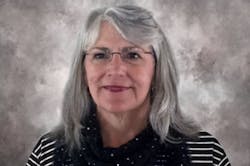Certification opens doors for quality, professionalism
Certification is a significant and increasingly important accomplishment in the healthcare industry — one that not only benefits the employee, but also the collective facility and the patients it serves. Now, more than ever, employers view certification as a way to evaluate whether an individual possesses the skills and knowledge required for successful performance in a particular job role. Employers want to hire the most qualified individual who will make a positive contribution to quality patient care. Those individuals who are certified may have that something extra that employers are seeking.
Certification helps affirm certain notable characteristics of an individual and organization. This is often, but not always, provided by some form of external review, education, assessment or audit. Most healthcare facilities are certified as an organization. Passing an accreditation survey, such as from The Joint Commission, is a healthcare organization’s process of certification. Some healthcare facilities have also earned the Magnet Recognition, a special award given by the American Nurses’ Credentialing Center. Magnet status is the highest and most prestigious distinction a healthcare organization can receive for nursing excellence and high-quality patient care.
The healthcare industry sees certification as the “special ingredient” necessary for safe patient care. Attaining and maintaining certification helps ensure safe quality care through process improvement and risk reductions based on knowing, understanding and following evidence-based standards. This is certainly important for those responsible for reprocessing medical instrumentation.
The Association for the Advancement of Medical Instrumentation (AAMI) recommends all personnel performing reprocessing activities be certified within two years of employment and then maintain that certification throughout their employment. AAMI also recommends that personnel assigned to supervisory functions be prepared for this responsibility through education, training and experience, and minimum recommended qualifications that include successful completion of a sterile processing management certification examination.
Raising the bar for quality
Patients rarely, if ever, meet Central Service (CS) professionals, but their effective care and treatment rely on the performance of those professionals just the same. Patients and healthcare colleagues count on CS technicians for safe, clean, sterile and well-functioning instrumentation. They depend on CS to follow current evidence-based best practices and stay ahead of the technology curve.
Certification helps meet these expectations and ensures that CS professionals have the important knowledge and skills needed for managing critical departmental responsibilities in a safe, effective and consistent manner. Additionally, the ongoing education requirements for professionals to maintain their certification status helps further ensure that these professionals stay on top of ever-evolving instrumentation, technology, standards and best practices to keep the department functioning at optimal performance.
The International Association of Healthcare Central Service Materiel Management (IAHCSMM) is a longstanding and dedicated advocate for CS professionals, and this is evident in IAHCSMM’s advocacy roles, including education and legislation at the individual state level. The Association’s highest legislative priority is to ensure there are certified CS technicians in every healthcare facility in every state. Currently, only four states (Connecticut, New Jersey, New York and Tennessee) require certification of CS technicians; however, IAHCSMM is actively pursuing legislation in other several states.
Facilities in states that do not currently require certification can and should make certification a requirement within their own organization. Managers or supervisors working in a state or facility that does not yet require certification are highly encouraged to work with their facilities’ Human Resources and administrative teams to educate them on the many merits of requiring CS certification as a condition of employment.
Certification of CS technicians assists with the following:
- Developing the basic level of understanding and knowledge for reprocessing medical devices;
- Providing internationally-recognized, competency-based measurable standards;
- Offering practice consistencies and standardization;
- Adding a professional element to the department; and, most importantly,
- Building self-esteem, confidence and authority to the individual who possesses it.
It’s important to point out that individuals do not have to wait for their state or facility to require certification. Instead, they can and should make a personal commitment to become certified; after all, CS is a profession and not just a job — and it’s a profession that has a real and direct impact on patient care, safety and outcomes. Our patients deserve the best and dedicated reprocessing professionals can help deliver that by becoming certified, committing to continuing education and maintaining an unwavering focus on quality.
For more information about IAHCSMM’s certification programs, including the new Certified Endoscope Reprocessor (CIR) offering, visit: www.iahcsmm.org/certification.html.
About the Author

Rose Seavey
Rose Seavey MBA, BS, RN, CNOR, CRCST, CSPDT, is an Educational Consultant to 3M Health Care. Ms. Seavey is President/CEO of Seavey Healthcare Consulting. Ms. Seavey is the 2019 recipient of the AAMI Standards Developer Award. Ms. Seavey is the author of the book tilted Sterile Processing in Healthcare Facilities: Preparing for Accreditation Surveys, published by AAMI, now in its third edition.
